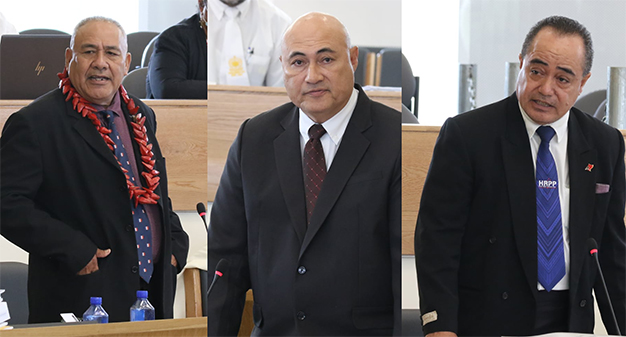By Mataeliga Pio Sioa
‘Faifeau’ or church ministers on the taxable income bracket are practically certain of not paying taxes if a new amendment goes through on the Tax Act 2021 debated during the week in Parliament.
The amendment exempts all ‘faifeau’ serving in a congregation with an annual income richer than the taxable threshold of $15,000.
Most of the Parliament debate was unusually toned down with a few exceptions, as Members treaded carefully, obviously mindful of the considerable ‘God Power’ influence of the ‘faifeau’ in the village community.
Deputy Prime Minister and Minister of Customs, Tuala Ponifasio, tabled the new amendment bill to ‘free up the faifeau’ tax on the argument that the law was not well set out by the previous HRPP Government.
The removal of the ‘faifeau’ taxes was in the FAST Government election manifesto and it helped mobilize the EFKS church support to vote out the HRPP Government.
Tuala believed that the forefathers of the country exempted the ‘faifeau’ from income taxes to underline the Christian devotion to the ‘Samoa Is Founded on God’ motto.
The Deputy PM suggested that there are still many uncollected revenues from unpaid taxes to cover the development needs of the country without having to tax the ‘faifeau’.
Mention was also made of a special meeting called by the Ministry of Revenue where the ‘faifeau’ protested at being taxed.
Parliament passed the second reading of the tax amendment bill and it is now with a House Select Committee for review before it returns for a third and decisive vote by Members.
While the general opposition reaction was resigned towards accepting the passage of the tax amendment, the intentions behind the taxing of the ‘faifeau’ were defended stoutly.
“This is a sensitive issue but I believe this should be left between the ‘faifeau’ and the law, we’re all people created by God with a special calling as His servants the same as the ‘faifeau,” opposition Aleipata itupa-i-luga MP Fuaava Suluimalo Amataga argued.
The MP did not agree with the signaling out of ‘faifeau’ as ‘ the servants of God’ and should be treated special.
Safata MP Leaana Ronnie Posini ran the same argument that the Lord does not signal any one out and that Jesus paid taxes too.
“ He’s our Supreme ruler yet he paid taxes, there is a big message there,” he felt.
Points made by opposition MPs about the respect for the laws passed in Parliament highlighted the defiance of the ‘faifeau’ after they were legally required to pay taxes.
EFKS ‘faifeau’ took their protest to court and was upheld in a ruling by the judges.
“What about the Head of State, His Highness was also required to pay taxes under the same law, everyone should obey the law including the ‘faifeau’,” Vaimauga No. 1 MP Sulamanaia Tauiliili Tuivasa reminded.
Disrespect of the Parliament by not obeying the laws passed is a serious concern for the MP going into the future.
In the case of the ‘faifeau’ tax the EFKS was the only church denomination to protest and it did not sit right with the MP Sulamanaia.
“The ‘faifeau’ disobeyed the law passed in Parliament unlike all the leaders of other church denominations who respected the law and that is a concern at what will happen in the future.”
Faleata No. 3 MP Lealailepule Rimoni Aiafi drove in strongly about the genuine intentions behind the passing of every law and how it is supposed to be for everybody.
“The spirit behind every legislation brought into Parliament is to serve the county,” he maintained in support of all the hard work by the previous Government put into the ‘faifeau’ tax legislation.
“There is a difference between correct preparations as in putting this legislation together and whether it was right for everyone.
“Leave the ‘faifeau’ tax law the way it is, lets not twist the politics into it.”
Former Minister of Commerce and Industry, Lautafi Selafi Purcell added insight into the Cabinet intention which was to be fair to everyone.
“The $15,000 tax threshold means not all the ‘faifeau’ are taxed, just those who earned more than that,” Lautafi explained.
The House debate heard that the average taxable income for serving ‘faifeau’ is between $50,000 -$100,000 a year.
Opposition to the special treatment of the serving ‘faifeau’ turned conciliatory when the majority felt it is only fair that all ‘faifeau’ should be exempt from paying income taxes.
Only ‘faifeau’ serving in congregations benefit under the new amendment if passed while others in administration work for the church are not included.
The timing of the new law if it is passed and come into effect also received several concerned reactions in the House with the effects of climate change and the COVID 19 pandemic on the global economy.
“The Bureau of Statistics figures for the 2020-2021 shows a drop in the economy by 2.3 per cent with wholesale and retail sales down for the period,” Sagaga 2 MP Maulolo Tavita Amosa found.
“Would it be fair to consider the weak status of our economy and delay the enactment of this new amendment to a time when our economy is strong enough,” Maulolo tried to reason.
The Deputy PM in his closing remarks on the tax amendment before it was carried by a majority vote promised that all views will be considered.
“We cannot turn a blind eye on the points raised but while it will be addressed it won’t all happen at the same time, the first step is to pass the amendment.”
Another key issue that will be under consideration are calls in the House for the refund of all taxes already paid under the current legislations by the ‘faifeau’ who obeyed the law.
Close to half a million tala was reportedly collected by the Ministry of Revenue in the 3 years the taxing of faifeau has been in place.
Parliament is to meet again in a few weeks time in March 2022.
